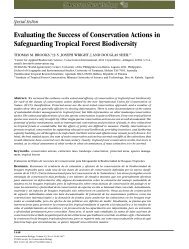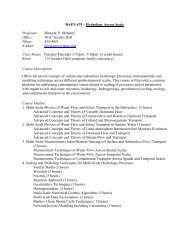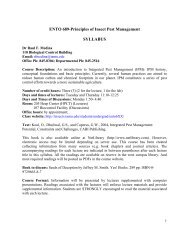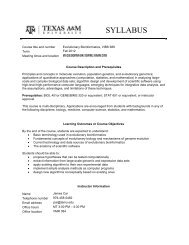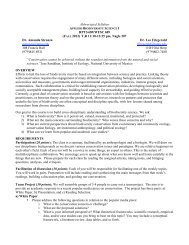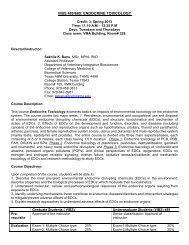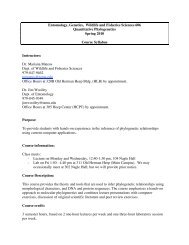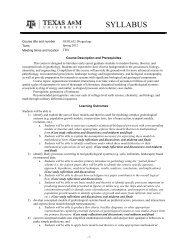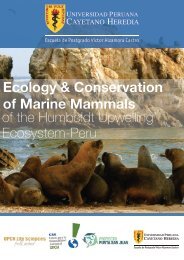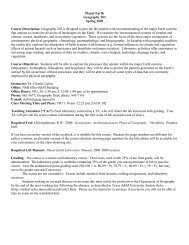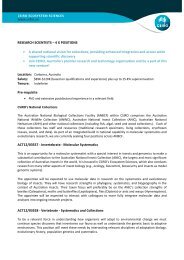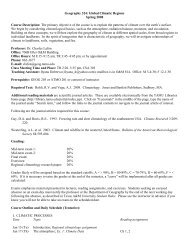syllabus - Ecology and Evolutionary Biology - Texas A&M University
syllabus - Ecology and Evolutionary Biology - Texas A&M University
syllabus - Ecology and Evolutionary Biology - Texas A&M University
You also want an ePaper? Increase the reach of your titles
YUMPU automatically turns print PDFs into web optimized ePapers that Google loves.
SYLLABUS<br />
Course title <strong>and</strong> number GEOL 651-600 Paleoecologial Community Analysis<br />
Term (e.g., Fall 200X) Fall 2011<br />
Meeting times <strong>and</strong> location MWF 10:20-11:10 Halbouty 304<br />
Course Description <strong>and</strong> Prerequisites<br />
The main aim of this course is to learn how to quantitatively analyze community-type ecological <strong>and</strong><br />
paleoecological data. Students will learn the statistical basis, use, <strong>and</strong> limitations of a variety of<br />
quantitative techniques including the measurement of diversity <strong>and</strong> diversity partitioning, cluster analysis<br />
to define biotic associations, <strong>and</strong> gradient analysis using both st<strong>and</strong>ard (parametric <strong>and</strong> non-parametric)<br />
<strong>and</strong> canonical ordination techniques. Some mathematical background will be reviewed, but the focus<br />
will be on application of methods to problems like the identification <strong>and</strong> characterization of communities,<br />
the use of gradient analysis in constraining stratigraphic <strong>and</strong> habitat change, <strong>and</strong> analysis of diversity<br />
<strong>and</strong> turnover in the relationship between local <strong>and</strong> regional communities. Introduction of community<br />
concepts <strong>and</strong> philosophical issues of defining living <strong>and</strong> fossil communities will be incorporated through<br />
readings from the peer-reviewed literature <strong>and</strong> discussion in class. The assignments focus on analyzing<br />
<strong>and</strong> interpreting a real data set (chosen by the student); the aim is to gain practice in interpretation of<br />
diversity <strong>and</strong> compositional data. All analyses will be carried out using the R statistical computing<br />
environment.<br />
Learning Outcomes or Course Objectives<br />
Students who successfully complete the course will be able to apply quantitative techniques in their own<br />
research involving the identification, characterization, <strong>and</strong> application of fossil ecological communities.<br />
Name<br />
Telephone number<br />
Email address<br />
Office hours<br />
Office location<br />
Thomas Olszewski<br />
845-2465<br />
Olszewski@geios.tamu.edu<br />
Instructor Information<br />
Monday 11:10-12:10, Thursday 9:00-10:00, or by appointment<br />
Halbouty 263<br />
Textbook <strong>and</strong>/or Resource Material<br />
Legendre, P., <strong>and</strong> Legendre, L., 1998, Numerical <strong>Ecology</strong>. Elsevier, 853 p. (This book is a<br />
comprehensive (overwhelming) reference on the analysis of multivariate ecological data. It is not an<br />
introductory level text, but is an excellent reference manual for practitioners of multivariate analysis in<br />
ecology – students should be able to underst<strong>and</strong> this text after successfully completing the course.)<br />
Borcard, D., Gillet, F., <strong>and</strong> Legendre, P., 2011, Numerical <strong>Ecology</strong> with R. Springer, 306 p. (This book is<br />
designed to accompany Legendre <strong>and</strong> Legendre with instructions on implementing multivariate methods<br />
in the R computing environment)
Grading:<br />
Grading Policies<br />
Participation, Quizzes, Homework: 10%<br />
Report #1: 20%<br />
Report #2: 20%<br />
Report #3: 20%<br />
Final Poster Presentation: 30%<br />
Letter grades will be assigned on the following scale:<br />
A ≥ 90% > B ≥ 80% > C ≥ 70% > D ≥ 60% > F.<br />
Each student will pick an appropriate data set (subject to the instructor’s approval) to explore using<br />
the techniques taught in class. Each of the reports listed above will describe exploration of the data<br />
using a different technique. Reports should be 3-5 pages of text, can include unlimited figures (with<br />
captions cited in the text), <strong>and</strong> should cite appropriate references. All methods covered are included in<br />
the VEGAN library in R (a powerful statistical analysis shareware program that can be downloaded <strong>and</strong><br />
installed for free). The final assignment will be a meeting-style poster synthesizing the results of each<br />
student’s analyses <strong>and</strong> will be presented in a poster session in lieu of a final exam. Posters will be<br />
evaluated on use of methods, soundness of interpretations, <strong>and</strong> presentation style.<br />
Attendance, punctuality, preparation, <strong>and</strong> attitude will be included in the participation part of the<br />
grade. Assignments are due at the beginning of class on the set date. Late assignments will be docked<br />
one full letter grade for each day late (i.e., after 4 days, no credit will be given); if, for some reason,<br />
meeting a deadline will not be possible, the student must contact the instructor beforeh<strong>and</strong> (see contact<br />
information at the top of the <strong>syllabus</strong>) or provide an official university excuse. Quizzes can be given at<br />
any time in class with or without prior announcement. This class will follow the <strong>University</strong>’s policy for<br />
excused absences. For more information, please see Section 7 of the student rules: http://studentrules.tamu.edu.<br />
Expectations<br />
Maximizing the quality of the educational experience requires effort from both the instructor <strong>and</strong> the<br />
student. As the instructor, I will do everything I can to provide you with access to necessary materials<br />
<strong>and</strong> expose you to fundamental concepts through lectures, readings, <strong>and</strong> assignments. I will make<br />
myself available as a resource outside of class when you are working through this material. I expect that<br />
you, as a student, will actively participate in the learning process. When something is confusing or<br />
unclear, you are expected to ask questions in class, see me for further clarification outside of class, or<br />
make the effort to teach yourself from other sources if necessary. I expect you to take an active role in<br />
your education rather than passively h<strong>and</strong>ing over all responsibility to me, your advisor, or anyone else.<br />
I will do what I can to help you master quantitative community analysis, but I expect an equal degree of<br />
engagement <strong>and</strong> effort from you.<br />
Course Topics, Calendar of Activities, Major Assignment Dates<br />
(Subject to change at instructor’s discretion)<br />
Week Topic Required Reading<br />
Week 1 – 29 Aug Introduction – Multivariate Analysis &<br />
Communities<br />
Review of Linear Algebra – Definitions<br />
<strong>and</strong> Notation<br />
Week 2 – 5 Sep Review of Linear Algebra – Matrices<br />
<strong>and</strong> Matrix Operations<br />
Review of Linear Algebra –<br />
Fundamental Geometry<br />
Week 3 – 12 Sep Review of Linear Algebra – Statistics:<br />
Mean, Variance, Correlation in Matrix<br />
Notation<br />
Parametric Ordination – Principal<br />
Ricklefs, R.E., 2008, Disintegration of<br />
the ecological community. American<br />
Naturalist, v. 172, p. 741-750.<br />
Introduction to R<br />
Organizing Community Data in a<br />
Digital Format <strong>and</strong> Uploading Data in<br />
R
Components Analysis<br />
(Report #1: Data Set; Due 9/16)<br />
Week 4 – 19 Sep Parametric Ordination –<br />
Transformation <strong>and</strong> St<strong>and</strong>ardization<br />
Measuring Similarity –<br />
Similarity/Difference Coefficients<br />
Week 5 – 26 Sep Parametric Ordination – Principal<br />
Coordinates Analysis<br />
Parametric Ordination –<br />
Correspondence Analysis<br />
Week 6 – 3 Oct Parametric Ordination -- Artifacts in<br />
Ordinations<br />
Flexible Shortest Path Adjustment<br />
Week 7 – 10 Octt No Class<br />
Week 8 – 17 Oct Non-Parametric Ordination – Non-<br />
Metric Multi-Dimensional Scaling I<br />
Non-Parametric Ordination – Non-<br />
Metric Multi-Dimensional Scaling II<br />
Week 9 – 24 Oct Cluster Analysis – Aims <strong>and</strong><br />
Strategies<br />
Cluster Analysis – Divisive Algorithms<br />
(Report #2: Ordination; Due 10/28)<br />
Week 10 – 31 Oct Cluster Analysis – Agglomerative<br />
Algorithms<br />
Cluster Analysis – Interpretation<br />
Week 11 – 7 Nov Canonical Techniques – Redundancy<br />
Analysis<br />
Canonical Techniques – Canonical<br />
Correspondence Analysis<br />
Week 12 – 14 Nov Canonical Techniques – Discriminant<br />
Analysis<br />
Canonical Techniques – Co-Inertia<br />
Analysis<br />
(Report #3: Clustering; Due 11/18)<br />
Week 13 – 21 Nov Measuring Diversity – Abundance<br />
Distributions, Entropy, <strong>and</strong> Indices<br />
Thanksgiving<br />
Week 14 – 28 Nov Measuring Diversity – Counting Rules<br />
<strong>and</strong> Sampling Strategies<br />
Measuring Diversity – Richness <strong>and</strong><br />
Rarefaction<br />
Week 15 – 5 Dec Measuring Diversity – Diversity<br />
Partitioning<br />
The VEGAN library in R<br />
Whittaker, R.H., 1967, Gradient<br />
analysis of vegetation. Biological<br />
Reviews, v. 42, p. 207-264.<br />
Implementing <strong>and</strong> Displaying<br />
Parametric Ordinations in R<br />
Jackson, S.T. <strong>and</strong> Overpeck, J.T.,<br />
2000, Responses of plant populations<br />
<strong>and</strong> communities to environmental<br />
changes of the late Quaternary.<br />
Paleobiology, supplement to v. 26(4),<br />
p. 194-220.<br />
FSPA <strong>and</strong> NMDS in R (including<br />
environment fitting functions)<br />
Implementing <strong>and</strong> Displaying Cluster<br />
Analyses in R (including 2-way<br />
clustering)<br />
Imbrie, J. <strong>and</strong> Kipp, N.G., 1971, A new<br />
micropaleontological method for<br />
quantitative paleoclimatology:<br />
application to a late Pleistocene<br />
Caribbean core. in Turekian, K.K., ed.,<br />
The late Cenozoic glacial ages, p. 71-<br />
147.<br />
Americans with Disabilities Act (ADA)<br />
Implementing <strong>and</strong> Displaying<br />
Canonical Ordinations in R<br />
Anderson et al., 2011, Navigating the<br />
multiple meanings of β diversity: a<br />
roadmap for the practicing ecologist.<br />
<strong>Ecology</strong> Letters, v. 14, p.19–28.<br />
Poster Evaluation<br />
12/9 – Final Poster Presentation<br />
Session<br />
The Americans with Disabilities Act (ADA) is a federal anti-discrimination statute that provides<br />
comprehensive civil rights protection for persons with disabilities. Among other things, this legislation<br />
requires that all students with disabilities be guaranteed a learning environment that provides for<br />
reasonable accommodation of their disabilities. If you believe you have a disability requiring an<br />
accommodation, please contact Disability Services, in Cain Hall, Room B118, or call 845-1637. For<br />
additional information visit http://disability.tamu.edu
Academic Integrity<br />
For additional information please visit: http://www.tamu.edu/aggiehonor<br />
“An Aggie does not lie, cheat, or steal, or tolerate those who do.”<br />
Academic Integrity: It is the responsibility of students <strong>and</strong> instructors to help maintain scholastic integrity<br />
at <strong>Texas</strong> A&M <strong>University</strong> by refusing to participate in or tolerate scholastic dishonesty. Commission of<br />
any of the following acts shall constitute scholastic dishonesty: inappropriately acquiring information,<br />
inappropriately providing information, plagiarism, conspiracy to cheat, fabrication of information, <strong>and</strong><br />
violation of departmental or college rules. This listing is not exclusive of any other acts that may<br />
reasonably be said to constitute scholastic dishonesty. Punishments for scholastic dishonesty may<br />
include the following: appropriate grade penalty up to <strong>and</strong> including an F in the course, letter of<br />
reprim<strong>and</strong>, conduct probation, expulsion, dismissal, or suspension. See the <strong>Texas</strong> A&M <strong>University</strong><br />
Student Rules (the source of this blurb) for a more complete statement on the definition <strong>and</strong> possible<br />
consequences of academic dishonesty. More information can also be obtained from Student Conflict<br />
Resolution Services (http://studentlife.tamu.edu/scrs/).<br />
Copyright <strong>and</strong> Plagiarism Policy: All materials used in this class are copyrighted. These materials<br />
include but are not limited to syllabi, quizzes, exams, lab problems, in-class materials, review sheets,<br />
<strong>and</strong> additional problem sets. Because these materials are copyrighted, you do not have the right to copy<br />
the h<strong>and</strong>outs, unless permission is expressly granted.<br />
As commonly defined, plagiarism consists of passing off as one's own the ideas, words, writings,<br />
etc., which belong to another. In accordance with this definition, you are committing plagiarism if you<br />
copy the work of another person <strong>and</strong> turn it in as your own, even if you should have the permission of<br />
that person. Plagiarism is one of the worst academic sins, for the plagiarist destroys the trust among<br />
colleagues without which research cannot be safely communicated.<br />
If you have any questions regarding plagiarism, please consult the latest issue of the <strong>Texas</strong> A&M<br />
<strong>University</strong> Student Rules, http://student-rules.tamu.edu/, under the section "Scholastic Dishonesty."



